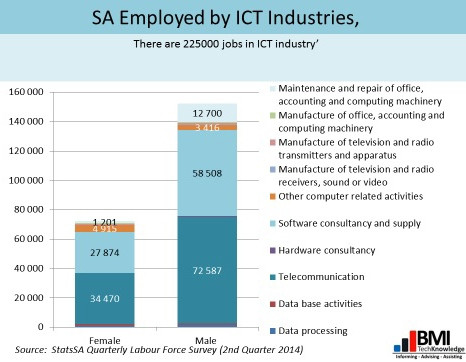
First National Bank (FNB) says government's plan to create 11 million more jobs by 2030 could be done if more than 49 000 small and medium enterprises (SMEs), growing at 20% each year, get off the ground.
Yet, say analysts, to meet this ambition, South Africa would have to seriously step up its tech reach, as ICT is a "critical" enabler for small businesses. Although ICT is a vital tool, as an employment sector, it will not fill the void.
The big four bank arrived at its figure through the Endeavor jobs calculator, a global tool developed by the International Labour Organisation, National Statistics Agencies and Endeavor Insights. Endeavor SA MD Catherine Townshend says: "Based on South Africa's urgent need to create jobs at a rapid scale, it is clear the country needs more support for businesses that have the potential to scale and create jobs much quicker than micro-enterprises or start-ups."
Mike Vacy-Lyle, CEO of FNB Business, notes there is funding available to boost business development, but the country needs to take a "realistic approach to ensure that such an investment yields the desired results".
Vital need
Tertia Smit, BMI-TechKnowledge analyst, notes the economy has been shrinking, and the number of small companies registered for value-added tax has been declining year-on-year. She adds employment declined in the first three quarters of 2014 after increasing for 12 consecutive quarters, but recovered in the last quarter of 2014, reaching 15.3 million.
"The unemployment rate averaged 25.1% in 2014, reflecting very little change over the past five years. Prospects for an improvement in employment are dependent upon substantial, sustained economic growth."
Smit adds ICT as an enabler can create lots of jobs in spaces such as online businesses and social media, as well as in innovation in aspects such as enabling smartphones as a tool for small enterprises. "There are always manual unskilled or low paying jobs, especially in the primary and secondary industries. But for highly skilled and well paid jobs, knowledge of the use of ICT is essential in all industries."
Several plans have been announced by ICT companies that will result in the creation of thousands of ICT jobs, such as taxi app Uber's aim to create 15 000 jobs in SA as a spill-over of the use of its technology, while international giants like Amazon and Facebook are also hiring.

Absa Investments analyst Chris Gilmour notes ICT is "critical" when it comes to creating more employment opportunities. "We need to free our minds from the notion that, for example, we have to present ourselves at a physical place in order to transact. We need to stop thinking like dinosaurs and start thinking the same way that the developed world person thinks."
ICT expert Adrian Schofield says small businesses grow their customer base by being connected, while access to cloud services makes life easier for them in scheduling, marketing, payments and the like. "They also need to be able to confirm their identity and register themselves without queuing in government offices.
"ICT is vital to just about every ambition. You cannot build, operate or maintain even the smallest enterprise without being connected in 2015."
What's needed?
Gilmour says, for technology to really have an impact, free, or at least reasonably priced WiFi everywhere would be a good start. "Our broadband is slow, unreliable and expensive. Change that and you are on the first rung of the ladder." Project Isizwe is working on a plan to connect 5% of SA's population to free WiFi by 2020.
Smit adds free broadband everywhere, and Internet access - especially in rural and peri-urban areas - is needed. She adds increased maths, science and computer science literacy and more ICT skills development from primary school right up to adult level is also vital.
"The government has committed very little for broadband over the next few years. There is no broadband strategy or implementation plan, they're just doing things in a piecemeal way at the moment."
Although ICT is an enabler, it is unlikely to - as an employment sector - create the amount of jobs the country needs to meet its targets. Smit explains there are only about 100 000 ICT jobs in SA and 2.25 million jobs in the ICT industry out of the 15.3 million jobs in SA, so ICT is a very small sector. "Even massive growth in that sector will not make a dent."
Uwe Brandkamp, sales director at WestconGroup Southern Africa, adds the number of small and medium ICT enterprises has steadily dwindled from around 12 000 in the early 2000s due to the difficult trading environment. "A programme that specifically makes preference to purchasing from or engaging with SMEs would have to be put in place to really start to achieve growth in this market. This would also have to include financial assistance in terms of payment terms and skills development for these smaller businesses."
Gilmour says ICT is a global growth sector, and SA is far behind global peers when it comes to technology, so the opportunities to catch up are great. Yet, for this to happen, government needs to reduce red tape and provide more financial incentives, an environment that does not currently exist, he notes.
Smit adds economic stability and growth as well as ICT policy certainty and a firm regulatory environment are vital to the sector, which has been under pressure and has been shedding jobs.
Share